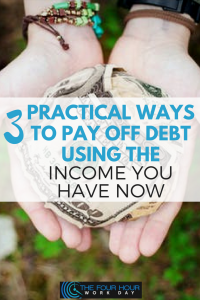 Getting out of debt is not easy. But with the right strategy and an ounce of discipline, you can pay off your debts.
Getting out of debt is not easy. But with the right strategy and an ounce of discipline, you can pay off your debts.
Most get out of debt advice out there tell you to add more income so that you can pay off your debts. And there’s really nothing wrong with this advice. In fact, this is great advice. With the extra income, you can use that to pay off debts.
But sometimes what you need is not extra income, but fewer expenses.
Most people fall into a ton of debt not because their income isn’t enough but because they’re living way above their means.
So before you try to find extra work for an extra income, try your best first to follow a budget and stick with it. Because sometimes, having an extra income will just give extra money to blow.
Using your income now, you can pay off your debts without having to work on a second job.
Here are 3 practical ways on how to do that.
1. Set aside a budget intended for debt payment only
Set an amount that you will only use to pay debts. Do not use this money for anything else other than it’s intended purpose.
Cut down on unnecessary expenses. Prioritize your fixed expenses or your needs such as water, electricity, rent, etc.
Eating out, or watching movies, should be taken into moderation.
Instead, use this extra money to add to your funds.
2. Talk to your creditors and ask for a discount
Talk to your creditors and explain your situation. Ask for a special payment plan or a discount. It never hurts to ask!
Do your research, too. There are companies that are willing to write off your debt so you don’t have to pay anything.
Make sure that you agree on the payment terms that you can afford based on your budget that you set on step 1. Also, if you have multiple debts, make sure to take that into consideration when you agree on a monthly payment plan to one creditor.
3. Decide on a payment strategy
Based on the budget you set and your agreement with creditors, you can now create a payment strategy.
Let’s use the following amounts as an example.
Debt 1: $300
Debt 2: $700
Debt 3: $1,000
Total: $2,000
Budget per month: $ 500
1) Pay debts in equal amounts
This is simple. Divide your budget equally among your debts.
Based on our example, the following payments will be made:
Debt 1: $166.67
Debt 2: $166.67
Debt 3: $166.67
The Up Side: Everything is covered.
The Downside: This might not be practical depending on the amounts you have to pay. Also, this would depend on the payment you agreed to pay to your creditors.
2) Ratio and proportion
Based on your budget, get the ratio and proportion like this:
(300 / 2,000) x $500 = $75
(700 / 2,000) x $500 = $175
(1,000 / 2,000) x $500 = $250
The Upside: You’re proportionally distributing your budget and no debt is left out.
The Downside: Depending on the agreement you had with your creditors, you might not be able to accurately follow this formula.
3) Pay the smallest or biggest amount or interest first
You can also opt to pay for the smallest amount or biggest amount.
The Upside: Paying the smallest amount first gives you a sense of accomplishment because now you’re only dealing with two debts instead of one!
This works best if you have many small debts. Pay them first so that you can focus on the bigger ones.
The Downside: When you prioritize the smallest amounts first, you’re earning more interest expense on the ones with higher rates.
4) Hybrid
This is my favorite strategy and one I used this to pay multiple credit card debts years ago.
Choose the smallest amount of debt and pay a big chunk of that first, and then pay minimum payments on the other debts.
Yes, you’re incurring interests on the other ones, but this method gave me a sense of fulfillment and peace of mind because I have a clear goal: to zero them out one by one.
Based on our example, you can pay a big chunk of Debt #1 and perhaps pay off that debt after two months. After that, you now have a bigger budget for Debt #2 and #3.
The Upside: You can be flexible! Especially when you have a special agreement with your creditors. You can use that agreement as a basis for your budget.
The Downside: It’s tempting to jump from one debt over the other. Resist that temptation because this might lead to higher interest rates.
Remember, have a budget, negotiate with creditors, and stick with your payment strategy.
Paying off debt isn’t easy but not impossible. Always remember to respect your hard-earned money so that you don’t fall for an impulse buy. This is your money after all! Earn it. Save it. Manage it wisely.
Track All Your Accounts With Personal Capital
 Personal Capital lets you see all of your accounts in one convenient place. Sign up now for free.
Personal Capital lets you see all of your accounts in one convenient place. Sign up now for free.More from my site
Joy
Latest posts by Joy (see all)
- Stay On Track with Your 2023 Goals! Here’s How - January 12, 2023
- How To Plan Your 2023 Business Goals - January 12, 2023
- How Social Media Has Changed and How This Impacts Your Business - November 20, 2022






Leave a Reply